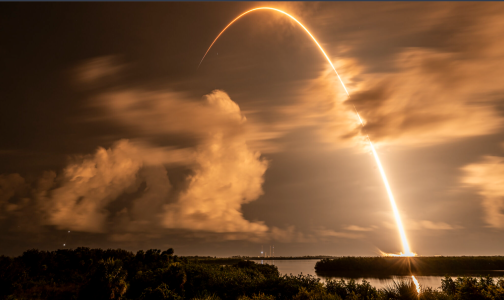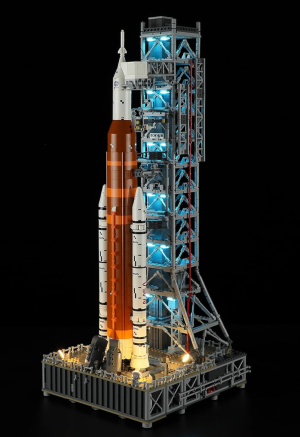You are using an out of date browser. It may not display this or other websites correctly.
You should upgrade or use an alternative browser.
You should upgrade or use an alternative browser.
Space stuff
- Thread starter theterminator93
- Start date
- Joined
- Sep 12, 2023
- Messages
- 3,142
- Location
- Charlotte, NC
- Cars in Garage
- 1
- Vehicle Details
- '95 Thunderbird with '18 TF 5.3L - SVO Engine
Double explosion! The top went first then the bottom!Space X explosion
- Joined
- Sep 12, 2023
- Messages
- 5,466
- Location
- Roselle, IL
- Cars in Garage
- 1
- Vehicle Details
- 1994 Cougar XR7 DOHC TR3650
Space X explosion
I haven’t seen a fire like that since the last spontaneously combusting Tesla video I watched!
Grog6
Moderator
- Joined
- Sep 22, 2023
- Messages
- 4,579
- Location
- Harriman, TN
- Cars in Garage
- 1
- Vehicle Details
- 2x 1996 Cougars, 1997 Tbird 4.6's all.
Elon's teslas aren't the only things on fire,lol.
Watching it frame by frame, the upper tank split at the end cap, then the whole thing unzipped down the side. It was supposed to be a partial fill of the methane tank, but a foll load of o2.
Watching it frame by frame, the upper tank split at the end cap, then the whole thing unzipped down the side. It was supposed to be a partial fill of the methane tank, but a foll load of o2.
- Joined
- Sep 12, 2023
- Messages
- 2,506
- Location
- North Ridgeville, OH
- Cars in Garage
- 2
- Vehicle Details
- 1997 Thunderbird 4.6, 1998 Mark VIII LSC
Yeah I heard about the free fireworks show a couple days ago.
Whatever they've been doing to try and work around the early engineering issues that they were experiencing doesn't seem to be working as well as one would hope. They reinforce this part, and the next component down the line fails as the next-weakest link. This vehicle is huge and hugely complex. How long will this last?
At the moment, despite its costs, SLS/Artemis is the only human-rated launch vehicle capable of getting humans out of LEO and back again; the feds want to pull the plug on it just as the investment begins to "pay off" with subsequent launches, and before any suitable successor has been proven? Despite the many years of delays with SLS (which have bought loads of time for SpaceX to get their crap together with Starship), it looks to me like Artemis III missing its target date won't be because of another SLS delay, it will be a Starship-induced delay. If the tables were reversed and NASA/SLS were ready to go but waiting on SpaceX, would SpaceX be under as much scrutiny as NASA has been with SLS's delays? Is SpaceX getting off easy because they're hiding in the wake of NASA's prudence?
IMO this is definitely not instilling confidence in our ability to "beat" China to the moon - let alone Mars.
Whatever they've been doing to try and work around the early engineering issues that they were experiencing doesn't seem to be working as well as one would hope. They reinforce this part, and the next component down the line fails as the next-weakest link. This vehicle is huge and hugely complex. How long will this last?
At the moment, despite its costs, SLS/Artemis is the only human-rated launch vehicle capable of getting humans out of LEO and back again; the feds want to pull the plug on it just as the investment begins to "pay off" with subsequent launches, and before any suitable successor has been proven? Despite the many years of delays with SLS (which have bought loads of time for SpaceX to get their crap together with Starship), it looks to me like Artemis III missing its target date won't be because of another SLS delay, it will be a Starship-induced delay. If the tables were reversed and NASA/SLS were ready to go but waiting on SpaceX, would SpaceX be under as much scrutiny as NASA has been with SLS's delays? Is SpaceX getting off easy because they're hiding in the wake of NASA's prudence?
IMO this is definitely not instilling confidence in our ability to "beat" China to the moon - let alone Mars.

- Joined
- Sep 12, 2023
- Messages
- 3,142
- Location
- Charlotte, NC
- Cars in Garage
- 1
- Vehicle Details
- '95 Thunderbird with '18 TF 5.3L - SVO Engine
Yeah I heard about the free fireworks show a couple days ago.
Whatever they've been doing to try and work around the early engineering issues that they were experiencing doesn't seem to be working as well as one would hope. They reinforce this part, and the next component down the line fails as the next-weakest link. This vehicle is huge and hugely complex. How long will this last?
At the moment, despite its costs, SLS/Artemis is the only human-rated launch vehicle capable of getting humans out of LEO; the feds want to pull the plug on it just as the investment begins to "pay off" with subsequent launches, and before any suitable successor has been proven? Despite the many years of delays with SLS (which have bought loads of time for SpaceX to get their crap together with Starship), it looks to me like Artemis III missing its target date won't be because of another SLS delay, it will be a Starship-induced delay. If the tables were reversed and NASA/SLS were ready to go but waiting on SpaceX, would SpaceX be under as much scrutiny as NASA has been with SLS's delays? Is SpaceX getting off easy because they're hiding in the wake of NASA's prudence?
IMO this is definitely not instilling confidence in our ability to "beat" China to the moon - let alone Mars.
It will last until they get it right. My guess is no more than 2 more years before they have the Starship system up to speed.
"If the tables were reversed and NASA/SLS were ready to go but waiting on SpaceX, would SpaceX be under as much scrutiny as NASA has been with SLS's delays? Is SpaceX getting off easy because they're hiding in the wake of NASA's prudence?"
Not sure exactly what you're asking here. Is one program dependent on the other in some form? I think scrutiny for the sake of safety is a good thing, all around. Scrutiny for the sake of how our tax dollars are being spent is also important and why the SLS/ORION program should be shit canned no matter how far along in development it is. Can you elaborate on what you mean by "Is SpaceX getting off easy because they're hiding in the wake of NASA's prudence?" ?
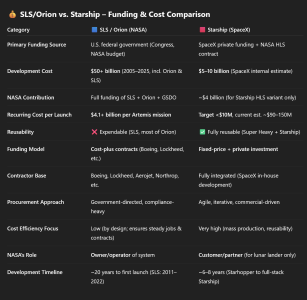
But, other than self imposed pressure to produce results,
Even though SLS/Artemis is "ready" or "Certified" it's not fully reusable and exorbitantly expensive to operate (Like everything NASA does) and that's not going to change or improve. OTOH, Starship is immensely cost effective, has greater crew capacity, greater payload capacity, etc. etc. The benefits are numerous. Just because Artemis is ready doesn't mean that it's better. What's the rush? Do we need to beat the Chinese back to the moon? No. Are the Chinese better equipped to get there before the US with Project 921 and the Long March 10? From what I've read, No.
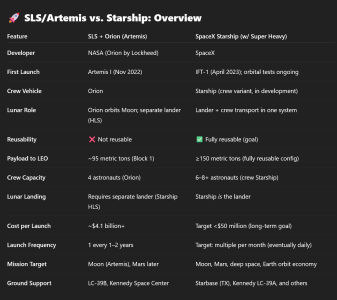
It was a test. They test to learn things. Epic explosion aside they learned what doesn't work. I have great faith that SpaceX will continue to work through the issues. Just look what they've done with streamlining the Raptor engine and increasing it's power output. They've already successfully launched a couple into orbit and they've caught the Super Heavy Booster TWICE!
I'd imagine that some of these engine changes were AI assisted. This engine is truly a thing of beauty and simplicity in design.
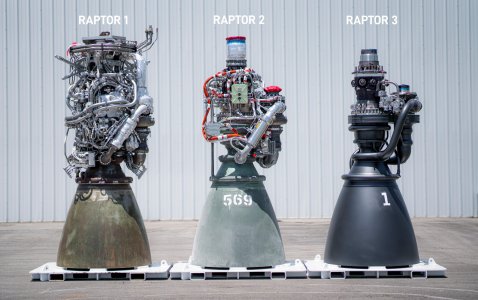
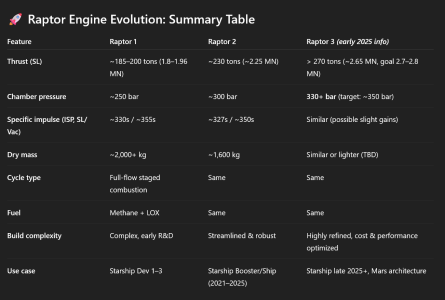
- Joined
- Sep 12, 2023
- Messages
- 2,506
- Location
- North Ridgeville, OH
- Cars in Garage
- 2
- Vehicle Details
- 1997 Thunderbird 4.6, 1998 Mark VIII LSC
Is one program dependent on the other in some form?
To my knowledge, yes. The Artemis program is NASA's initiative to get humans outside of LEO again, starting with the Moon and onto Mars. Starship was started because of the NASA contract awarded to SpaceX to create a vehicle to ferry astronauts to/from the lunar surface from an orbital lunar space station. Without Artemis, there was no contract to spur along the development of Starship. And without Starship, there's no way to ferry astronauts from Orion to/from the lunar surface.
The irony is the deep desire for cost reduction at the outset of the development of the program has been the root of the cost overruns. The decision was made to reuse engineering designs which had their origins in the 70s (which eventually became the Space Shuttle) as the basis for the launch vehicle for Orion. All of that equipment had to be re-engineered for applications not originally intended, lines that had long been shut down reactivated, and for what... making 50 year old designs come alive again? Did we save money by taking a shortcut with "proven" designs, that had to be reverse-engineered by teams of people who had to do all the flight engineering work all over again? Certainly not!
I agree, there is a huge money pit under SLS. But like the similarly bloated F35 program, at what point is it too big to kill? Pull the plug after the bulk of the investment has already been made, with no opportunity to take advantage of the money already spent? Developing an alternative will be equally costly and egregiously time consuming. Finding an off-ramp may be the best solution, but I can't help but feel like it may be premature to put all our eggs in one basket when we still have no idea what will hatch from them. It's all the more impressive to look back at the Apollo program of the 60s with the more limited technology available to them at the time. To do what they did back then in the time they took, with what they had, is astounding.
Can you elaborate on what you mean by "Is SpaceX getting off easy because they're hiding in the wake of NASA's prudence?" ?
NASA is taking intense heat for cost and time overruns (perhaps rightly so). Because of the SLS time and cost overruns, it's giving SpaceX gobs of additioanl time to work out the issues with their own designs. Put another way, NASA nudges the launch date for Artemis II and III by a few years, giving SpaceX more time to figure out their end of the program while NASA takes the heat for another delay. If you recall in 2022 when Artemis I first rolled out, Artemis III was originally scheduled to launch sometime this year, and it would have required Starship (refueled in orbit) to have been ready by now as its crew's ferry to/from the moon. If Artemis I hadn't been delayed due to fuel leaks on the pad and Artemis II/III not delayed even more due to heat shield investigations, we'd quite possibly be on the moon figuring out more about how to make life on Mars possible by now. Or would we - with Starship still being 2-3 years away from the point where it can refuel in orbit and do its job as a lunar ferry? In this vein the point is that I think SpaceX is not in the crosshairs for their own delays because NASA's delays have been drawing the attention of everyone, buying them time.
Overall I think my point is that while something needs to be done about the costs of SLS and Orion, pushing the proverbial "nuclear" button to kill it before it's done its job is both the most drastic option and, IMO, the most hasty. As they taught us at US Space Academy, "Undue haste makes waste".
The wheels of government turn slowly (or backwards, as my wife puts it), but when we've gotten this far - do we waste the product or use it for all it's worth?
Grog6
Moderator
- Joined
- Sep 22, 2023
- Messages
- 4,579
- Location
- Harriman, TN
- Cars in Garage
- 1
- Vehicle Details
- 2x 1996 Cougars, 1997 Tbird 4.6's all.
When I worked in R&D, (medical), we had an 18 month cadence of major revisions. We were bought out by a major company, and everything went to hell. I was told working with the major company was like working for the govt.
The design I made in 2005 was considered "too good", because it never failed. All but 20 or so of the 100k units were still working well in 2017, when I was fired for pissing off the now CEO 5 years before I even worked there, lol. They're still selling my 2007 design, and there's 1 circuit I designed in their newest machine, lol. Design cycles are now 20 years. And all the circuit boards are made in china, lol.
It's not hard for 1 person to kill a rocket. And I'm sure Elon is wonderful to work for, lol.
The design I made in 2005 was considered "too good", because it never failed. All but 20 or so of the 100k units were still working well in 2017, when I was fired for pissing off the now CEO 5 years before I even worked there, lol. They're still selling my 2007 design, and there's 1 circuit I designed in their newest machine, lol. Design cycles are now 20 years. And all the circuit boards are made in china, lol.
It's not hard for 1 person to kill a rocket. And I'm sure Elon is wonderful to work for, lol.
- Joined
- Sep 12, 2023
- Messages
- 3,142
- Location
- Charlotte, NC
- Cars in Garage
- 1
- Vehicle Details
- '95 Thunderbird with '18 TF 5.3L - SVO Engine
I think that the something that needs to be done about the costs of SLS and Orion is to push the proverbial "nuclear" button; and that killing it before it's done its job is the most reasonable, rational, and logical option that needs to be taken. Drastic, yes. But I don't think it's hasty or not prudent. The cost efficency of the SLS is low, by design, to ensure steady jobs and contracts. This is unacceptable except to those who rely on the votes from those workers and their families and kickbacks/political donations from those contractors. The epotomy of gov. corruption and ineffency.
At some point you have to rip the band-aid off and cut your losses. For example, the RAH-66 Comanche helicopter program was finally canceled in 2024 after the gov. sunk approximately 6.9 Billion into it over 20 years! Only 2 prototypes were ever built. Had it gone to full production planned total program costs could have been north of 39 billion. So, the question is, how much MORE is SLS going to cost and is it worth it? I wish congress (the feds) would kill the program and cut our losses.
Like you said, they're trying to resurrect and repurpose an old horse when a (Literally) shiny new, modern car (Starship/Super Heavy Booster) AND integrated production/launch facility sits on the beach in South Texas. Despite the latest issues, SpaceX is showing significant progress in their development and, as outlined in the funding and cost comparison section of my previous post, SpaceX is getting it done at a fraction of the cost of the SLS program.
I say we waste the product, cut our past AND future losses and move on.
At some point you have to rip the band-aid off and cut your losses. For example, the RAH-66 Comanche helicopter program was finally canceled in 2024 after the gov. sunk approximately 6.9 Billion into it over 20 years! Only 2 prototypes were ever built. Had it gone to full production planned total program costs could have been north of 39 billion. So, the question is, how much MORE is SLS going to cost and is it worth it? I wish congress (the feds) would kill the program and cut our losses.
Like you said, they're trying to resurrect and repurpose an old horse when a (Literally) shiny new, modern car (Starship/Super Heavy Booster) AND integrated production/launch facility sits on the beach in South Texas. Despite the latest issues, SpaceX is showing significant progress in their development and, as outlined in the funding and cost comparison section of my previous post, SpaceX is getting it done at a fraction of the cost of the SLS program.
I say we waste the product, cut our past AND future losses and move on.
Grog6
Moderator
- Joined
- Sep 22, 2023
- Messages
- 4,579
- Location
- Harriman, TN
- Cars in Garage
- 1
- Vehicle Details
- 2x 1996 Cougars, 1997 Tbird 4.6's all.
Ron, you are exactly describing the "military Industrial Complex" Ike warned us about. The Bradley, the Osprey, and now the f35 and SLS are all welfare for engineers with connections, that suck at their jobs.
- Joined
- Sep 12, 2023
- Messages
- 2,506
- Location
- North Ridgeville, OH
- Cars in Garage
- 2
- Vehicle Details
- 1997 Thunderbird 4.6, 1998 Mark VIII LSC
What's the old government joke? Something like this?
Government: "Build me a fence."
Contractor 1: "Sure, it'll cost $2,000,000."
Contractor 2: "I get it. It'll cost $3,000,000."
Contractor 3: "Can do. It'll cost $6,000,000."
Government to Contractor 3: "$6,000,000? That's way too expensive."
Contractor 3 whispers to the government: "$2,000,000 for you, $2,000,000 for me, and we hire the first guy to do the job for us."
Government: "Deal"
Government: "Build me a fence."
Contractor 1: "Sure, it'll cost $2,000,000."
Contractor 2: "I get it. It'll cost $3,000,000."
Contractor 3: "Can do. It'll cost $6,000,000."
Government to Contractor 3: "$6,000,000? That's way too expensive."
Contractor 3 whispers to the government: "$2,000,000 for you, $2,000,000 for me, and we hire the first guy to do the job for us."
Government: "Deal"
- Joined
- Sep 12, 2023
- Messages
- 3,142
- Location
- Charlotte, NC
- Cars in Garage
- 1
- Vehicle Details
- '95 Thunderbird with '18 TF 5.3L - SVO Engine
SLS loses its thrust vectoring nozzle. Fails test. SpaceX eliminated this problem by vectoring the whole, smaller engine.
- Joined
- Sep 12, 2023
- Messages
- 2,506
- Location
- North Ridgeville, OH
- Cars in Garage
- 2
- Vehicle Details
- 1997 Thunderbird 4.6, 1998 Mark VIII LSC
This is a test of a new manufacturing process and different fuel chemical compound, both of a design not planned for use until Artemis 9 - not likely to fly. If it does, it won't be going anywhere for at least 10 years; I'd say they have plenty of time to work out the bugs. 
OTOH, they had a successful test of the first "new" RS25 engine since the shuttle program about the same time as the failed booster test. This engine was manufactured for use with Artemis V - A toss as to whether that one will fly as well.
OTOH, they had a successful test of the first "new" RS25 engine since the shuttle program about the same time as the failed booster test. This engine was manufactured for use with Artemis V - A toss as to whether that one will fly as well.
- Joined
- Sep 12, 2023
- Messages
- 3,142
- Location
- Charlotte, NC
- Cars in Garage
- 1
- Vehicle Details
- '95 Thunderbird with '18 TF 5.3L - SVO Engine
I can see this turning into an SLS/Artemis vs. Starship thread.This is a test of a new manufacturing process and different fuel chemical compound, both of a design not planned for use until Artemis 9 - not likely to fly. If it does, it won't be going anywhere for at least 10 years; I'd say they have plenty of time to work out the bugs.
OTOH, they had a successful test of the first "new" RS25 engine since the shuttle program about the same time as the failed booster test. This engine was manufactured for use with Artemis V - A toss as to whether that one will fly as well.
Imagine where the Starship program will be in 10 years and how much MORE SLS/Artemis will cost. I still think they should cut their losses and kill the SLS program now.
So, let me get this straight. They’re testing a concept of a design that’s not likely to fly for 10 years - if at all?
- Joined
- Sep 12, 2023
- Messages
- 2,506
- Location
- North Ridgeville, OH
- Cars in Garage
- 2
- Vehicle Details
- 1997 Thunderbird 4.6, 1998 Mark VIII LSC
While I think we'll have to agree to disagree... I still think it's unwise to scrap your only working car because it's gotten expensive to drive before you take delivery of the replacement you have on order. 
dDUBb
PostWhore
I still think it's unwise to scrap your only working car because it's gotten expensive to drive before you take delivery of the replacement you have on order.
Just take an Uber .. $RKLB.
- Joined
- Sep 12, 2023
- Messages
- 3,142
- Location
- Charlotte, NC
- Cars in Garage
- 1
- Vehicle Details
- '95 Thunderbird with '18 TF 5.3L - SVO Engine
Just take an Uber .. $RKLB.
$RKLB Wow! Hope you got some of that when it was under $4. I always see these AFTER they've had their huge run.
dDUBb
PostWhore
$RKLB Wow! Hope you got some of that when it was under $4. I always see these AFTER they've had their huge run.
My DCA is around $20 on $RKLB .. ( 70% gain as of today ).
They've been getting more contracts and improving launch capabilities. I can see more upside in their future.
- Joined
- Sep 12, 2023
- Messages
- 2,506
- Location
- North Ridgeville, OH
- Cars in Garage
- 2
- Vehicle Details
- 1997 Thunderbird 4.6, 1998 Mark VIII LSC
Looks like a successful Starship 10 flight today - all goals achieved. 
Also, funding secured for Artemis through Artemis V, and all components to complete the stacking of Artemis II are now at KSC on-track for a springtime launch.
Also, funding secured for Artemis through Artemis V, and all components to complete the stacking of Artemis II are now at KSC on-track for a springtime launch.
Grog6
Moderator
- Joined
- Sep 22, 2023
- Messages
- 4,579
- Location
- Harriman, TN
- Cars in Garage
- 1
- Vehicle Details
- 2x 1996 Cougars, 1997 Tbird 4.6's all.
IDK if any of you remember hearing in the news ~25 years ago, during testing at Arnold afb in their wind tunnel, they were testing cockpit canopies vs bird strikes, using an air cannon to fire turkey carcasses at various speeds. 
I worked for this idiot in 2000. They destroyed the canopy, the holding fixture, and blew a hole in the wall of the windtunnel, causing millions in damage. They didn't thaw the 40 lb turkey! These guys are our MIC.

I worked for this idiot in 2000. They destroyed the canopy, the holding fixture, and blew a hole in the wall of the windtunnel, causing millions in damage. They didn't thaw the 40 lb turkey! These guys are our MIC.

CDsDontBurn
PostWhore
IDK if any of you remember hearing in the news ~25 years ago, during testing at Arnold afb in their wind tunnel, they were testing cockpit canopies vs bird strikes, using an air cannon to fire turkey carcasses at various speeds.
I worked for this idiot in 2000. They destroyed the canopy, the holding fixture, and blew a hole in the wall of the windtunnel, causing millions in damage. They didn't thaw the 40 lb turkey! These guys are our MIC.

I remember that story!
Boston-Bull
Veteran Poster
- Joined
- Sep 12, 2023
- Messages
- 2,506
- Location
- North Ridgeville, OH
- Cars in Garage
- 2
- Vehicle Details
- 1997 Thunderbird 4.6, 1998 Mark VIII LSC

NASA’s Moonbound Artemis II Rocket Reaches Launch Pad - NASA
At 6:42 p.m. EST on Saturday, Jan. 17, NASA’s Artemis II SLS (Space Launch System) rocket and Orion spacecraft reached Launch Pad 39B after a nearly
Wet dress rehearsal in about 2 weeks - let's hope they sorted out the issues learned the last time - with a launch as early as a week later.
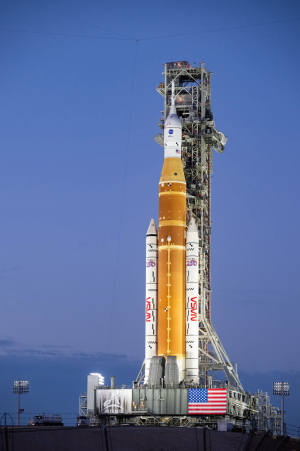
- Joined
- Sep 12, 2023
- Messages
- 3,142
- Location
- Charlotte, NC
- Cars in Garage
- 1
- Vehicle Details
- '95 Thunderbird with '18 TF 5.3L - SVO Engine
CDsDontBurn
PostWhore
The space program has always amazed me. Too bad it's just a fraction of what it once was.
Grog6
Moderator
- Joined
- Sep 22, 2023
- Messages
- 4,579
- Location
- Harriman, TN
- Cars in Garage
- 1
- Vehicle Details
- 2x 1996 Cougars, 1997 Tbird 4.6's all.
Another chance at seeing northern lights the next couple of days.
Edit: Jeez it's cold out! 24F With a 20mph breeze. Went out till my nuts froze, ~10 minutes,lol.
no lights.
Edit: Jeez it's cold out! 24F With a 20mph breeze. Went out till my nuts froze, ~10 minutes,lol.
no lights.
Last edited:
- Joined
- Sep 12, 2023
- Messages
- 2,506
- Location
- North Ridgeville, OH
- Cars in Garage
- 2
- Vehicle Details
- 1997 Thunderbird 4.6, 1998 Mark VIII LSC
I'd be happy with 24. 2 atm, wind chills are 15 below. 
- Joined
- Sep 12, 2023
- Messages
- 3,142
- Location
- Charlotte, NC
- Cars in Garage
- 1
- Vehicle Details
- '95 Thunderbird with '18 TF 5.3L - SVO Engine
Oh yeah, that’s lakeside living! Hang in there! Curl up in your basement home theater and wait it out.I'd be happy with 24. 2 atm, wind chills are 15 below.
FWIW it’s 30 outside now with a high of 44 today. On the flip side, mild winters here make for brutal summers.
Grog6
Moderator
- Joined
- Sep 22, 2023
- Messages
- 4,579
- Location
- Harriman, TN
- Cars in Garage
- 1
- Vehicle Details
- 2x 1996 Cougars, 1997 Tbird 4.6's all.
Mosquitos are the drag here in the summer. I think this year, I'll try mosquito netting.
- Joined
- Sep 22, 2023
- Messages
- 1,592
- Location
- Waterloo, Iowa
- Cars in Garage
- 1
- Vehicle Details
- 1991 Mercury Cougar LS 5.0
We get mosquitoes and -9° for a high this coming Friday.
I just want 50°, salt free roads and a lot less tread on my rear tires!
I just want 50°, salt free roads and a lot less tread on my rear tires!
Similar threads
-
Stupid, ridiculous, hilarious obviously AI created images and videos
- Started by KevinVarnes
- Replies: 31
-
-
-
-

